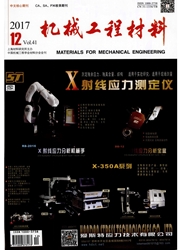

 中文摘要:
中文摘要:
将复合稳定剂稳定(C-TZP)、Y2O3稳定(Y-TZP)和CeO2稳定(Ce-TZP)四方相氧化锆多晶陶瓷在200℃水热处理0~45 h,研究了水热处理前后陶瓷的微观形貌、物相组成,以及不同水热时间下的力学性能,分析了其水热老化机理。结果表明:随着水热时间的延长,3种氧化锆陶瓷的硬度、抗弯强度及断裂韧性均有不同程度下降,其中Y-TZP陶瓷的下降幅度最大,C-TZP陶瓷的次之;与水热处理前的相比,Y-TZP陶瓷水热处理30 h后其单斜相体积分数增加了58%,Ce-TZP陶瓷和C-TZP陶瓷水热处理45 h后单斜相含量增加较少,Y-TZP陶瓷的抗水热老化性能最差;Y2O3是引起水热老化的直接原因,减少Y2O3增加CeO2含量有利于抑制水热老化,其水热老化过程符合氧化锆陶瓷水热老化的化学腐蚀模型。
 英文摘要:
英文摘要:
Composite stabilizer-stabilized (C-TZP), Y2O3-stabilized (Y-TZP) and CeO2-stabilized (Ce-TZP) tetragonal zirconia polycrystalline ceramics were hydrothermally treated at 200℃ for 0-45 h. The micromorphology, phase composition, and the mechanical properties at different hydrothermal time of the ceramics before and after hydrothermal treatment were studied. The hydrothermal aging mechanism was also analyzed. The results show that with the increase of hydrothermal time, the hardness, bending strength and fracture toughness of three zirconia ceramics all decreased, among which the decrease range of the Y-TZP ceramics was the largest, followed by that of the C-TZP ceramics. Comparing to that before hydrothermal treatment, the volume fraction of the monoclinic phase in Y-TZP ceramics increased by 58% after hydrothermal treatment for 30 h, while that in Ce-TZP and C-TZP ceramics increased relatively little after hydrothermal treatment for 45 h. The hydrothermal aging resistance of the Y-TZP ceramics was the worst. The direct reason for the hydrothermal aging was because of the addition of Y2O3. Decreasing the Y2O3 content and increasing the CeO2 content was in favor of controlling the hydrothermal aging. The hydrothermal aging process coincided well with the chemical etching model of the zirconia ceramics.
 同期刊论文项目
同期刊论文项目
 同项目期刊论文
同项目期刊论文
 期刊信息
期刊信息
